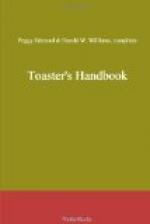Now we are going to add a special paragraph for the absolutely inexperienced person—who has never given, or heard anyone else give, a toast. It would seem hardly possible in this day of banquets to find an individual who has missed these occasions entirely—but he is to be found. Especially is this true in a world where toasting and after-dinner speaking are coming to be more and more in demand at social functions—the college world. Here the young man or woman, coming from a country town where the formal banquet is unknown, who has never heard an after-dinner speech, may be confronted with the necessity of responding to a toast on, say “Needles and Pins.” Such a one would like to be told first of all what an after-dinner speech is. It is only a short, informal talk, usually witty, at any rate kindly, with one central idea and a certain amount of illustrative material in the way of anecdotes, quotations and stories. The best advice to such a speaker is: Make your first effort simple. Don’t be over ambitious. If, as was suggested in the example cited a moment ago, the subject is fanciful—as it is very apt to be at a college banquet—any interpretation you choose to put upon it is allowable. If the interpretation is ingenious, your case is already half won. Such a subject is in effect a challenge. “Now, let’s see what you can make of this,” is what it implies. First get an idea; then find something in the way of illustrative material. Speak simply and naturally and sit down and watch how the others do it. Of course the subject on such occasions is often of a more serious nature—Our Class; The Team; Our President—in which case a more serious treatment is called for, with a touch of honest pride and sentiment.
To sum up what has been said, with borrowings from what others have said on the subject, the following general rules have been formulated:
Prepare carefully. Self-confidence is a valuable possession, but beware of being too sure of yourself. Pride goes before a fall, and overconfidence in his ability to improvise has been the downfall of many a would-be speaker. The speaker should strive to give the effect of spontaneity, but this can be done only with practice. The toast calls for the art that conceals art.
Let your speech have unity. As some one has pointed out, the after-dinner speech is a distinct form of expression, just as is the short story. As such it should give a unity of impression. It bears something of the same relation to the oration that the short story does to the novel.




